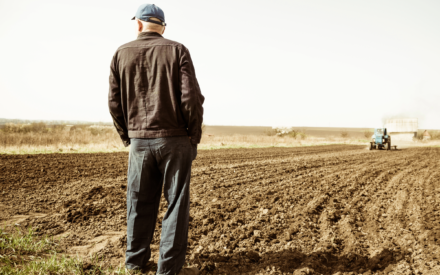Trauma is often thought of as a one-time event that was “traumatic” to the person(s) involved in the event. However, trauma can come from so much more than just a one-time event.
It is true that trauma can happen from a singular accident on the farm, but it can also happen from the continuation of chronic exposure to repeated events. How often are you experiencing stress from constant responsibilities, injuries or illnesses, the tension between multiple generations that run the farm, the instability of the agricultural economy, or the weather? For many farmers, these are constant stresses that can impact your mental health.
When all or some of these events are taking place and are not being processed, the body can start feeling the experiences as trauma. If your body experiences this feeling of trauma, it can potentially cause you to experience a range of physical, mental, emotional, and behavioral reactions.
Traumatic events can cause immediate, delayed, or long-term reactions. Everyone reacts differently to trauma, and no reaction is right or wrong. There are several factors that can impact how someone reacts to trauma. Having available support, a positive or solution-focused personality, and resiliency can make it easier to process stressful events. “Feeling helpless, having limited support, a number of stressors at one time or prior trauma can be a sign that additional assistance processing and recovering is necessary,” according to Jes Beauchamp, Licensed Clinical Social Worker, and Wisconsin Farm Center Tele-Counselor. “The Wisconsin Farm Center can connect farmers or family members with an experienced counselor at no charge through their Counseling Voucher Program.”
Some common reactions to trauma include:
- Feeling on “high alert”
- Become emotional/upset more frequently
- Feel tired or exhausted
- Not wanting to leave the farm/home/your family
- Reduced concentration and memory
- Repeatedly playing the stressors over in your mind
- Feeling detached or withdrawn from those around you
- Disturbed sleep
- Headaches
- Increased heart rate
- Turning to substances
These are your body’s normal reactions, and in most cases, they subside as a part of the body’s natural healing and recovery process over time and by managing stressors.
There are a number of strategies that can help resolve traumatic reactions, including:
- Recognize distressing or frightening experiences and that the body could react.
- Become aware of personal triggers and avoiding them or becoming more prepared to face them.
- Have a plan to regulate and cope.
- Accept that it can take time to feel normal after experiencing a trigger, and that it will also eventually pass.
- Remind yourself daily that you are managing, and learning to accept that things might not be done as well or efficiently as normal.
- Do not use alcohol or drugs as a coping strategy.
- Avoid making major decisions or big life changes until recovering.
- Set time aside to rest when feeling exhausted.
- Make time for regular exercise to ease tension.
- Help family and friends to help you by telling them what you need.
- Relax by using relaxation techniques, such as yoga, meditation, listening to music, or other enjoyable activities.
- Express feelings as they arise, and talking to someone about your feelings or writing them down.
Using skills to manage trauma responses can lessen the chance that happens, because you are teaching your body to respond differently to the triggers. If you have tried these techniques but your body is still reacting to these responses, it could be a signal that you may need outside help.
Wisconsin Farm Center
Experiencing a challenge on the farm? Contact the Wisconsin Farm Center! With more than one hundred years of collective agriculture experience, the Wisconsin Farm Center team offers free and confidential financial and transition planning services, conflict mediation, veterinary diagnostic analysis, and more. They can be reached at 800-942-2474 or farmcenter@wisconsin.gov. More information on programs and services is available at https://farmcenter.wi.gov



 February is Heart Health Month — Achieve a Happy Heart!
February is Heart Health Month — Achieve a Happy Heart! Community is important for emotional well-being
Community is important for emotional well-being Extension Educators Supporting You(th)
Extension Educators Supporting You(th) Working together to address farmer well-being and mental health
Working together to address farmer well-being and mental health